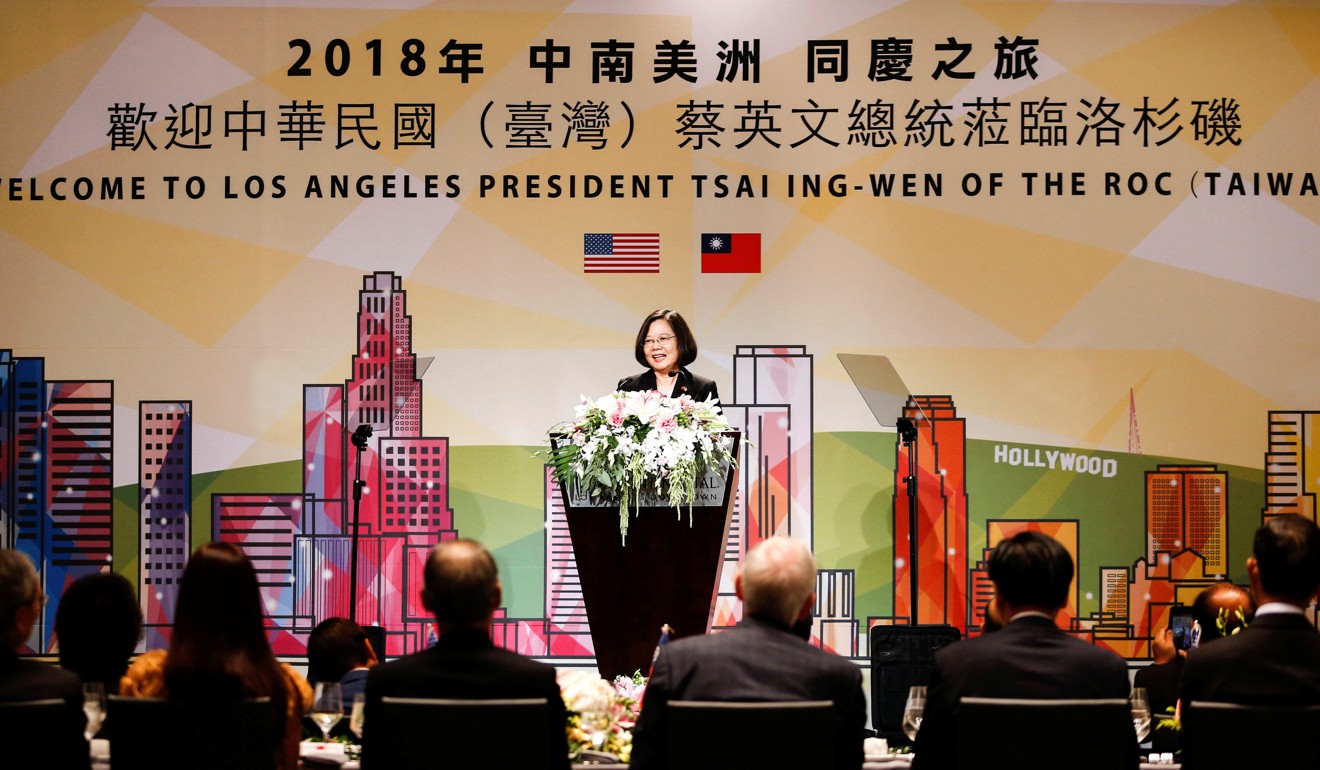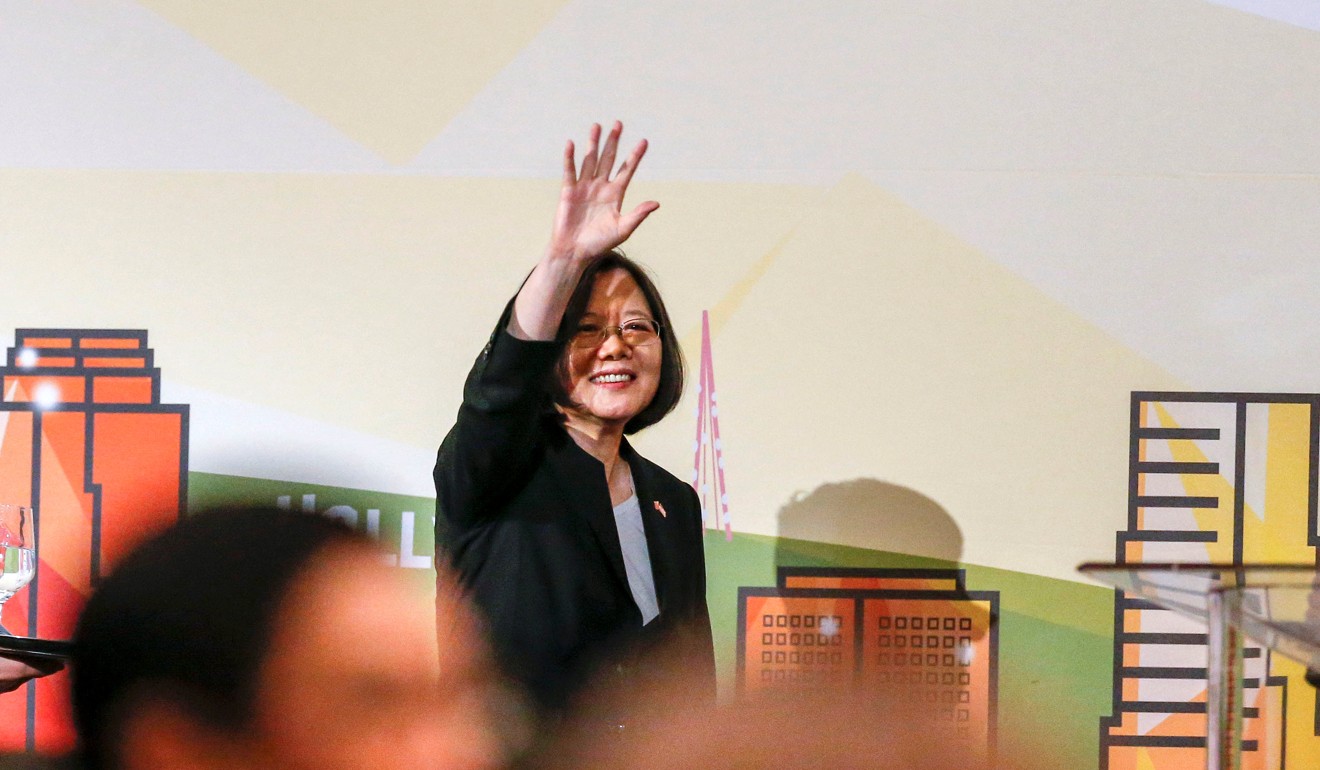
Senior US politician calls for Taiwan’s president to be granted trip to Washington
Tsai’s high-profile transit visit certain to irk Beijing, with a call for overseas Taiwanese to return to serve the self-ruled island
A trio of pro-Taiwan US House representatives in California joined Taiwan leader Tsai Ing-wen during her stopover in Los Angeles with one of them calling on the US government to grant her an unprecedented visit in the US capital.
The three US House lawmakers, including Foreign Affairs Committee chairman Ed Royce, the committee’s Asia and Pacific subcommittee ranking member Brad Sherman and Congresswoman Judy Chu, greeted Tsai in Los Angeles, the first transit stop during her nine-day trip to the island’s two South American allies.
Tsai arrived in Los Angeles on Sunday night in a high-profile transit visit that is certain to irk Beijing, with a call for overseas Taiwanese to return to serve the self-ruled island.
The transit marks the first stopover for the Taiwan president after the US Congress unanimously passed the Taiwan Travel Act early this year, which President Donald Trump signed into law, allowing US government officials at all levels, including cabinet-level national security officials, to travel to Taiwan and high-level officials of Taiwan to enter the US.
During his remarks, Sherman revealed that the Taiwan Travel Act was aimed at encouraging Taiwanese presidents to visit the US capital Washington.
Sherman who called himself a “strong advocate for US-Taiwan alliance” addressed his legislative intention that “I want to see one of the highest level” of visits between the US and Taiwan and that is to “welcome you [Tsai Ing-wen] in Washington DC”.

Ed Royce, a Republican Congressman who helped ensure the passage of the Taiwan Travel Act through Congress, said “We’ve seen many positive developments in the US-Taiwan relationship this year, including the enactment of the Taiwan Travel Act”.
“By encouraging more frequent visits between our two peoples and governments, we further strengthen the critical US-Taiwan partnership,” Royce said.
Tsai was escorted by motorcade to a Los Angeles hotel where more than 500 supporters held banners and placards reading “Good luck, Taiwan,” and “Hello Ms President.” Pro-China supporters were on hand to denounce Tsai by hiring a small plane flying a banner reading “One China! Taiwan is part of China”.
An hour or so later, Tsai headed to the Culture Centre of Taipei Economic and Cultural Office in El Monte where she met some 1,000 Taiwanese expatriates in a talk and persuaded them to return to Taiwan for work because Taiwan now has the necessary capital and proper regulations for overseas expatriates should they choose to work on the island.
“This is a great opportunity that one should never miss. If you return, we will be responsible for hooking you up with Taiwanese society,” she said.
Tsai also said her first-ever talk at the premises of Taiwan’s representative office in the US was “a very important start” of a changeable policy. She did not elaborate.
Tsai was scheduled to give a speech at the Ronald Reagan Presidential Library on Monday, the first ever made by any presidents from Taiwan during their transit stays. She is expected to meet with some heavyweight US officials before heading to Paraguay in the evening.

Unlike previous times, journalists, including those who travelled with Tsai to LA, were allowed to follow her to all the locations for her public activities. This practice used to be barred in line with the old protocol agreed upon by Taipei and Washington that all activities by Taiwanese leaders during their US transit stays must not be made public and must remain low key.
“This is a breakthrough,” said Hsiao Bi-khim, a legislator of the independence-leaning Democratic Progressive Party (DPP), who followed Tsai on her visit, according to the Taipei-based semi-official Central News Agency.
Beijing has closely observed Tsai’s visit and observers said the treatment she is receiving would further infuriate the mainland. It has done all it can to make Tsai succumb to the “one China” principle, including isolating Taiwan internationally, staging war games near the island to step up military intimidation and suspending official communications and exchanges with the island. Tsai, of the DPP which opts for Taiwan independence, has refused to accept the “one-China” policy since she became president in 2016.
“The one-China principle represents the universal consensus of the international community,” a spokeswoman at the Chinese Embassy in Washington said in a statement on Sunday. “Any attempt to create ‘two Chinas’ and ‘one China, one Taiwan’ will be opposed by all Chinese people and it does not serve the fundamental interests of the people in Taiwan.”
Taiwan has lost four diplomatic allies – Sao Tome and Principe, Panama, the Dominican Republic and Burkina Faso – since Tsai took office in May 2016. Beijing has also tried hard to woo Paraguay and Belize – the two Latin American nations where Tsai is making state visits, and which still have diplomatic ties with Taiwan.


